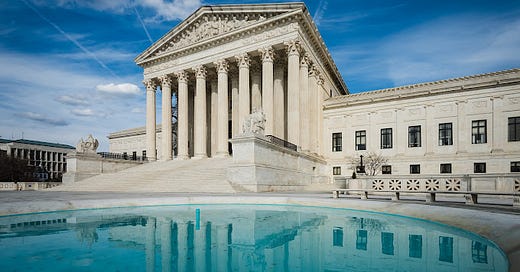US Supreme Court Hears Trump's 14th Amendment Disqualification Case
Supreme Court Poised to Allow Trump on Colorado Ballot? Implications for Presidential Eligibility
Supreme Court Poised to Allow Trump on Colorado Ballot? Implications for Presidential Eligibility
In a significant turn of events, the Supreme Court on Thursday (February 8) signaled its inclination to permit former President Donald Trump to remain on the Colorado ballot, sparking a nationwide discussion on the constitutional and political implications of disqualifying a presidential candidate through a state level decision. This deliberation among the Justices, spanning the ideological spectrum, underscores the profound concerns about the potential for a single state to unilaterally determine a candidate's eligibility for national office.
Unanimous Concerns Across the Bench
The Justices, regardless of their conservative or liberal leanings, demonstrated a unified apprehension about the political chaos that could ensue should the Colorado Court's decision to remove Trump from the ballot stand. This unity suggests a potential for a unanimous or near-unanimous ruling in favor of Trump, reminiscent of the Apex Court's pivotal role in the 2000 presidential election through Bush v. Gore.
Constitutional and Political Stakes
The core of the Supreme Court's review revolves around a post-Civil War constitutional provision— the 14th Amendment— designed to prevent individuals who engaged in insurrection from holding office. This case marks an unprecedented examination of whether a state court is empowered to enforce this clause against a former President, reflecting on the delicate balance between state rights and federal electoral integrity.
Analysis: Supreme Court's Deliberation and Broader Implications
The Supreme Court's impending decision on Trump's eligibility to appear on the Colorado ballot not only addresses the immediate legal challenge but also sets a precedent that could influence the contours of American democracy and the rule of law.
Constitutional Interpretation and Presidential Eligibility
At the core of this case is the interpretation of the 14th Amendment and its relevance to presidential eligibility. The Justices' inquiries reflect a careful stance against letting a single state's judiciary influence the national electoral framework, underscoring the importance of a coherent and uniform adherence to constitutional principles. This is particularly pertinent given that Donald Trump has not been legally determined to have engaged in or directly abetted an “insurrection”—in relation to the January 6th Capitol disturbance—in any criminal trial or civil litigation.
Political Ramifications and Electoral Integrity
The potential for a state-level decision to exclude a leading presidential candidate from the ballot raises significant concerns about electoral integrity and the democratic process. The Justices' reflections signal an awareness of the disruptive impact such a precedent could have on future elections, emphasizing the importance of voter enfranchisement and the collective right to choose political leaders.
The Role of the Supreme Court in Electoral Disputes
The Supreme Court's fast-tracking of this case indicates a recognition of its critical role in resolving electoral disputes. A unanimous or near-unanimous decision could enhance the ruling's acceptance among the public, reinforcing the court's position as a stabilizing force in American democracy.
Future Implications for Presidential Elections
The outcome of this case will undoubtedly influence the eligibility criteria for presidential candidates, potentially affecting how former officials implicated in acts of insurrection or rebellion are viewed in the context of future electoral contests. Moreover, this decision could serve as a reference point for addressing similar challenges in other states, ensuring a degree of legal consistency across the nation.
Navigating the Political and Civic Landscape
The arguments presented to the Supreme Court reflect broader societal concerns about the political and civic landscape in the United States. The justices' deliberation touches on historical precedents, the evolving nature of impeachment proceedings, and the unprecedented efforts to subvert election results, underscoring the complexity of the issues at hand.
Summing Up
As the Supreme Court approaches a verdict on former President Trump's eligibility for the Colorado ballot, this case extends beyond mere legal considerations, engaging with essential issues of constitutional governance, electoral integrity, and the foundational values of American democracy. The impending decision will not just influence Trump's immediate political trajectory but also mold the legal and political context for future discussions on presidential eligibility.
However, this might not be the final issue regarding Trump that the Supreme Court will need to address, as the debate over presidential immunity, stemming from the DC Federal Court's criminal charges for attempting to subvert the 2020 election process, is likely to reach the nine Justices soon. Let’s wait and see.





